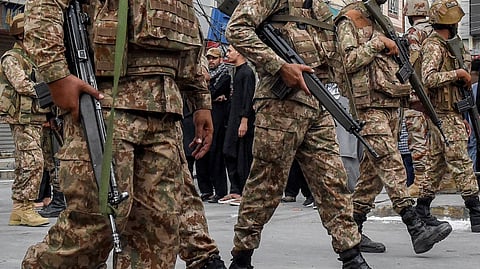Explained: Pakistan’s anti-terrorism Bill amendment restoring detention powers
New law allows 3-month preventive detention with judicial oversight to counter terrorism

Dubai: Pakistan President Asif Ali Zardari gave his assent to the Anti-Terrorism (Amendment) Bill, 2025, a key legislation aimed at strengthening Pakistan’s counterterrorism framework while ensuring legal safeguards and judicial oversight.
The bill, passed in August by both the National Assembly and the Senate, restores previously expired powers for law enforcement and armed forces to detain suspects for up to three months without formal charges.
According to a statement from the President’s House, the law “ensures transparency and accountability in detentions, with a built-in three-year sunset clause to limit its duration.” It also includes judicial safeguards, allowing detainees recourse against misuse or abuse of authority.
Preventive detention
The legislation revises a section of the Anti-Terrorism Act (ATA) of 1997, which provides a legal framework for combating terrorism, sectarian violence, and serious offences. Under the amended law, federal authorities or armed forces acting on government orders can issue detention orders against individuals suspected of terrorism, extortion, kidnapping for ransom, or other activities threatening national security. Preventive detention can now be imposed based on “credible information or reasonable suspicion,” enabling authorities to disrupt potential terrorist plots before they are executed
Legal safeguards and oversight
The law mandates that any detainee be produced before a magistrate within 24 hours of arrest. Detention beyond the three-month period must comply with protections under Article 10 of the Constitution, which guards against arbitrary arrests. Investigations are to be conducted by Joint Investigation Teams (JITs) comprising police, intelligence agencies, and civil armed forces, supervised by an officer not below the rank of Superintendent of Police.
Government lawmakers emphasised the necessity of the amendment in light of Pakistan’s resurgent militant threat. “We cannot allow terrorists to roam freely while innocent people are slaughtered in provinces, on trains like the Jaffar Express, or in targeted attacks,” said PML-N Senator Irfan Siddiqui last month.
The bill’s statement of objects and reasons underlines that the country’s “current security situation requires a robust response” beyond existing laws, empowering law enforcement to carry out intelligence-led operations effectively.
Anti-Terrorism Act, 1997
The ATA of 1997 is a comprehensive law that defines terrorism broadly, covering acts intended to spread fear, cause injury, or damage property. It establishes Anti-Terrorism Courts (ATCs) for expedited trials and grants law enforcement significant power including:
Conducting searches without a warrant under reasonable suspicions
Using force to prevent terrorist acts after warning
Freezing assets and proscribing organisations involved in terrorism
Calling in armed forces to assist civil authorities




